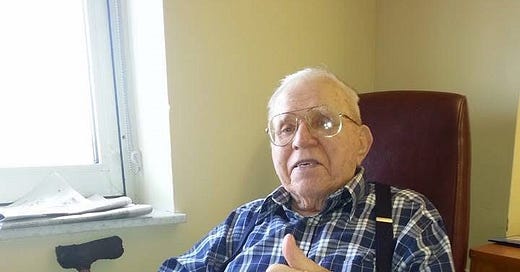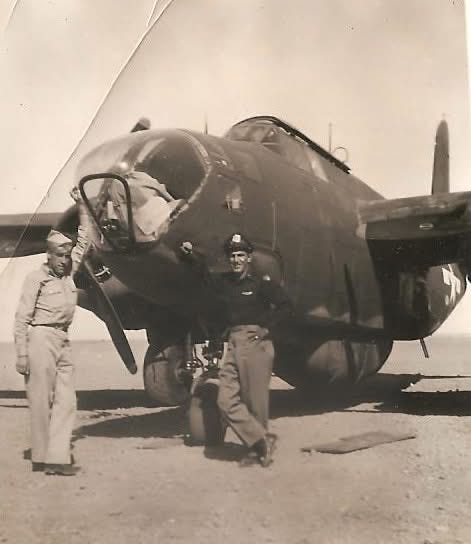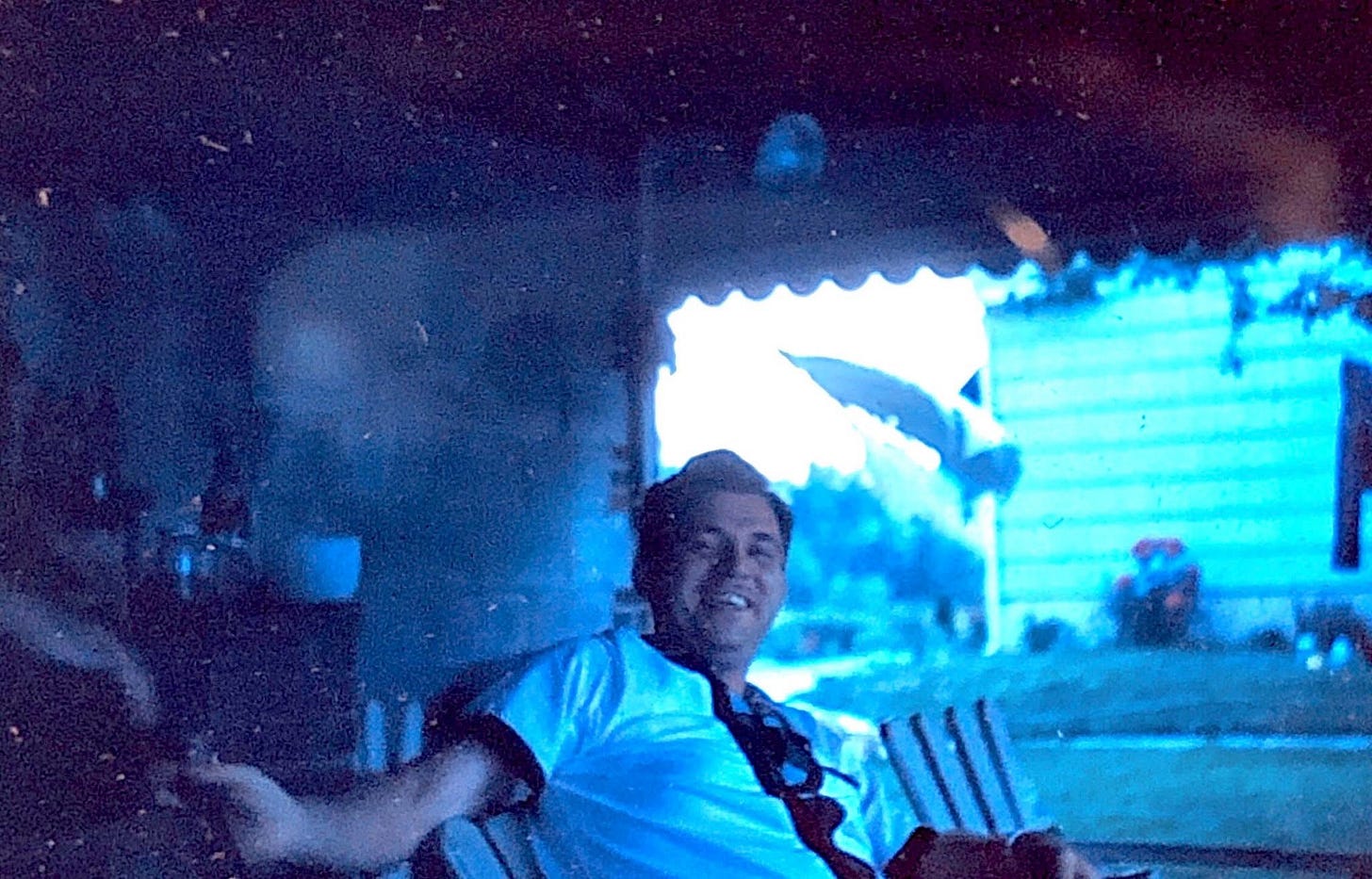Author’s Note: Friends, over the course of the past four or five years, I’ve made a point of adding or updating an essay about my father’s military service and posting it around Memorial Day. What began as a short remembrance of my dad, who was a reluctant soldier, has grown substantially. I add to it each year, including this year. Despite its expanding, I fear we still haven’t come to any conclusions. But we’ll keep trying, if for no other reason then because my father deeply disliked being a soldier and perhaps he’d appreciate my attempts to come to terms with this part of my family history.
Some of you have, no doubt, already read sections of this essay. Some of you, who are new to Day By Day, will be seeing this for the first time. Everyone will be unfamiliar with the updates and new section.
The essay is long, so I’m going to break it into two parts, today and tomorrow. I’ll say only this about this ongoing project - I have no intention of cheer-leading. My hope only is to maybe just get us talking about what being a hero actually means. I know how my father felt, and that’s really all I know. I leave any judgement to you all and post without further comment.
Part 1: The Ceremony
For the past couple years, I found myself standing in the parking lot of my daughter’s school listening to an elementary school Memorial Day concert. That didn’t happen this year, but more on that in a moment.
There is always a small section up front reserved for a handful of veterans. At one point, while a recording of “Grand Old Flag” plays, one of the classes presents the veterans with hand-made poppies.
Each class takes turns singing some patriotic anthem. Some individual kids come up and read a poem or an essay.
Three years ago, Little Bean’s first grade class drew the “America the Beautiful” straw and she sang delightfully, mimicking the motions of a tall tree, fruited plains and crowning thy good. This is the same as I did when I was her age. Another song had something to do with being a hero but for the life of me I couldn’t hear much of it over some nearby construction. She did, however, wear a red, white and blue, headband.
Two years ago, there was a bucket band, with a group of mostly boys playing plastic buckets decorated with red, white and blue stars.
Last year, in third grade, she sat right out in front, first row, and wore a red sparkling head band. She admitted that the head band was actually for Valentine’s Day but she decorated it with butterfly hair clips so that somehow made it work for a Memorial Day concert.
Her class sang Lee Greenwood’s “God Bless the USA” though everybody knows that song as Proud to be an American. At the proud verse, the kids all stomped their feet and stood up tall.
Incidentally that song by Greenwood was released on May 21, 1984. Thirteen days later, Bruce Springsteen released “Born in the U.S.A.” I’ll leave it to you to debate which is a more appropriately patriotic song.
This year, just last week, bad weather forced the whole ceremony into the gym of the school. The result of that change was that only a select group of veterans and the families of a couple kids who had solos were allowed to attend due to space concerns.
In other words, for the first time, I didn’t go. This greatly displeased my daughter.
“But we worked so hard at this and now we don’t have anyone to sing to,” she complained the night before.
“You have the veterans who are going to be there, baby,” I told her. “Just sing your best anyway.” I paused. “Just do your best and sing like you would if we were there.”
She grumbled about it, and later that night wasn’t terribly talkative. She just said, “Fine,” when I asked her how it went.
Don’t tell my daughter I said this but I was relieved I didn’t have to go this year.
You see, for me, over the course of the last few years, as I stand there on the hot pavement, it always begins to feel like these ceremonies start to bleed together. There’s going to be a parade. And then sometime soon is Flag Day and Fourth of July, and there’s Veterans Day and Armed Forces Day. There’s also an actual holiday called Loyalty Day. Some communities still celebrate that.
There no longer appears to be any separation between the meaning and the actual purpose behind the holidays.
I confess to just feeling tired by it all. Did you know, for example, that the original last stanza of the poem that became “America the Beautiful” is not “And crown thy good with brotherhood / From sea to shining sea.” Rather, early feminist Katharine Lee Bates ends her poem with the not so gentle reminder, “Till nobler men keep once again / Thy whiter jubilee.” She was referring to Chicago’s “White City” 1893 exposition but the Congregationalists didn’t want there to be any… let’s say mix up… and added the brotherhood line whole cloth.
We sing a song celebrating nature and technology and heroes on a day designed to honor the valor of dead soldiers, in an elementary school parking lot with little kids reciting poems about the glory of war and handing poppies to living veterans, and all I can think about is my father peeling potatoes in the Army in occupied Japan.
And how he begged me to stay as far away from the military as possible. Since he passed in 2017, his honor is at stake on Memorial Day and yet he’d be mortified to be memorialized in such a way. Why do I know that? Because he told me. Many times.
I feel mixed up. Every year, I feel sad about the whole thing.
Part 2: The Romance
The romance of military service never existed in my family like I see so often in other circles.
My uncle, my father’s brother, was a crew member of a Douglas A-26 Invader, a long range, heavy bomber. My father always referred to him as a gunner, so as near as I can figure, his job was to man the Invader’s rear 20mm cannons. Some versions of the Invader had gun turrets mounted under the wings, and up to eight 0.50 caliber machine guns mounted in the nose. My uncle’s plane could fly as fast as 355 miles per hour, had a range of 1,400 miles and, finally, could carry up to 4,000 pounds of bombs.
She was powerful, and deadly. No wonder the plane was often referred to as the “grim reaper.”
I don’t know this because he told me. In fact, I know only the most rudimentary details about his role in the service because he refused to talk to me about it. Lord knows I tried. As a young man, such a job felt adventurous and, dare I say it, fun. I begged him for stories, but he’d just smile and shake his head.
“Let your uncle alone,” my father would scold. “He didn’t do anything worth telling.” The two brothers would share a glance, and even at my young age I understood that look to mean, that he did indeed do many things worth telling.
It was only much, much later that I realized that those things were horrible things.
My father was drafted into occupied Japan right at the end of the war. He spent his time there, overseas, as a supply sergeant. Unlike his brother, as near as I could tell he saw no engagement. But he did have to deal with being an occupier. My dad, unlike my uncle, was more than happy to talk about his time in Japan, a place and people he grew to respect and a culture – I believe -that fashioned his worldview.
He spoke often about how polite all the natives he met were, expecting them to hate him, expecting them to harbor anger or resentment. He recalled a day when he and his buddies decided to drive as far up Mount Fuji as they could. The Jeep broke down and it took a “little old Japanese man” to do the repairs.
“But what did you do as part of the military,” I would ask him. I was looking for adventure. I wanted my dad – there in a foreign country, in a uniform – to be bold and noble and exciting. But he was not. At least not in the way my young, foolish self was looking for.
“Well,” he’d begin slowly, “mostly I didn’t listen very well and ended up walking up and down a lot of stairs. Mainly I peeled potatoes the entire time I was there.”
We’ll continue our Memorial Day exploration tomorrow with Part 2. I hope you’ll join us with consideration and discussion.







My dad served in WWII in the Pacific. His eyesight was too bad for combat so he was part of the group that moved in after the battles were won to deal with what was left. What he saw prompted him to go into the ministry.
My dad, in the Navy, was on a battle ship in the South Pacific (was transferred to a new ship 2 days before Pearl Harbor was hit. He never talked much about the war, he did what he had to do to stop the spread of non Democracy, and tried to move on. My mother was a Wave and worked telegraph codes. I had a friend who was dropped three times in Vietnam, and was the only one who survived, physically but not mentally or spiritually. "Proud to Be an American" makes me cry for those that died protecting Democracy, and "Born in the USA" makes me want to get up and cheer. They both serve a great purpose. I hate war, and do not understand how people cannot just get along, but I understand defending against fascism and other one rule governments.